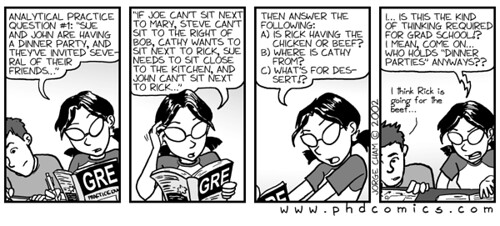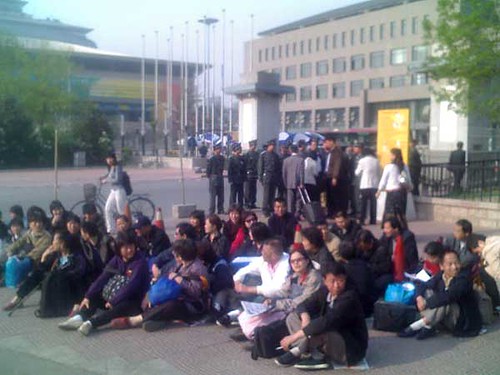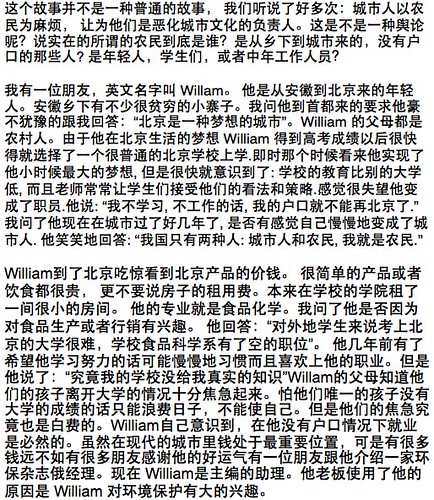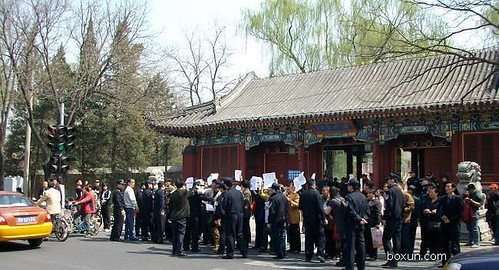
First, the quickest of skimable summaries: Professor of Law (a ‘specialist’ in mental health I hear) at Peking University Sun Dongdong (that last bit means ‘East East’, so no sniggers), in a recent interview with a Chinese magazine (their homepage here), called 99% of petitioners (with their troubled history) mentally ill. This sparked protests by petitioners outside both Beida’s West and East gates (picture from boxun.com). He’s since apologised, but still… I feel ashamed to be a student at a university at which Professor Sun still teaches.
I asked a couple of my friends at Beida what they thought. One of them witnessed the protests outside the West gate himself last Tuesday morning: he confirmed it was a completely peaceful protest of 30 to 50 petitioners, one holding up a sign ‘Fight for Human Rights’. They looked more despondent than insane to him. Here’s what he writes:
l have just checked some other responses about this event from the internet. There are more than 99% of them against Sun. So l do not think l need to write any word about him. If anyone would like to consider him as somebody, then they must be crazy.
From last year, especially because of the well-spread wrong expectations from so-called experts opinons about the finacial crisis, there are common opinions about the disvaluation of any experts. So, Sun would be just another case for that. You might call it the Experts’ Crisis.
Secondly, there is another common opinion which has lasted for a long time (many many years): you do not need to care so much about some experts’ statements, especially when he/she claims they come from Peking University.
Thirdly, l agree with such an observation: if more than 99% of petitioners are mentally ill, that must become true simply because the system makes it so. That is, the petition system in modern China makes originally normal petitioners become crazy one day.
Finally, in my eyes, those elder petitioners l saw that day are just a hopeless, peaceful, calm, and pure or even naive older generation who must be disadvantaged because of the rapid transformation pace of modern China. l can not see any wild behaviors they would make at all. They need help. That is all.
And Tony‘s liang juzi:
Yes, I read the articles on the web about Sun. He is too careless with words, as many people (and even him himself) have pointed out. And it is a dangerous judgment. More petitioners will be forcefully sent to mental hospitals because they “interrupt the public order” under his logic.
But there could be other incentives for Sun to say those stupid things. As soon as I heard the news, what directly came to my mind is Sun, just like many other PKU professors, was making use of the media and public debate to make himself famous (or notorious, as it turned out). chao zuo …… these things DO happen around us. Many teachers in the university are respectable. But there are some professors who dream to be popular overnight. And the rising of mass media in China provides them with a great opportunity.
About the Chinese xinfang/petition, it is a “decent” way for people to challenge the government according to our law. But the institution is not effective enough. Petitioners’ appeals are often ignored by local government officials, who concern about their personal interests all the time. Many petitions become insane because they get refused from time to time by the county government. They want to go upper to the provincial or even central government (in China, people trust the central government in Beijing rather than their local ones, exactly different from the United States), but are sometimes blocked and threatened by county officials.
So far, I’ve heard no wind of any kind of protest by Beida students themselves – however much their sympathy lies with the petitioners (I’d consider the two opinions above pretty representative of more liberal students at PKU). But I’ll bet even more officials in Zhongnanhai than foreign observers will remember that the May 4th coming up is ninety years on from 1919 and twenty from 1989 – two days when Beida students rose up for what they believed is wrong in the society they would soon take a leading role in. And this time, with graduate unemployment rising, there’s a grumble rumbling.
On a lighter note … happy Easter everyone!
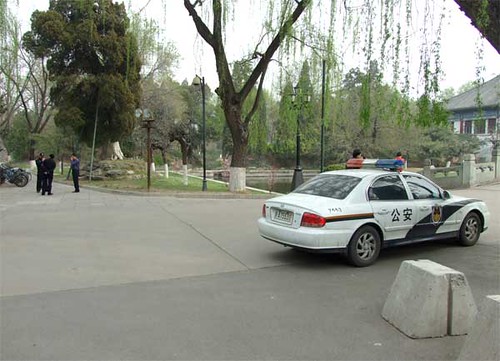
A lonely police presence inside Beida's West gate - and outside the gate, over 30 policemen and another half dozen cars. I took this pic on Friday morning: I got the wrong gate! 40 or so petitioners gathered outside the East gate shortly after my class began. Shucks.
UPDATE: The first friend I quote above has since written me an email in response to my final paragraph above:
Each year, May fourth and June fourth comes around, and for students, their major concerns are just employment. So they are not political but economical animals right now. But do not assume that they would go on strike this year because of financial crisis. Because they are patriotic,too. That means they know their country are better than others. And they have a duty to make it as stable as possible. In sum, they know they would have a better future (especially compared with foreign countries), but only in a relatively stable environment. And they believe this administration tries so hard to make them have better life already. They are satisfied with current administration so much.
I agree with this – my experience of Beida students has been entirely in line with the above. The absence of student outrage over Sun Dongdong points most of all to an off-hand dismissal of his ridiculous comment, but also to a tendency to keep quiet rather than risk
anything by speaking up. My argument, to clarify, is that prospects of unemployment only make it more likely students may argue for reform within, not of, the system. And my hope is that no student ever takes it for granted that such a comment from a representative of their university is so out there as to not bother to condemn it openly.

